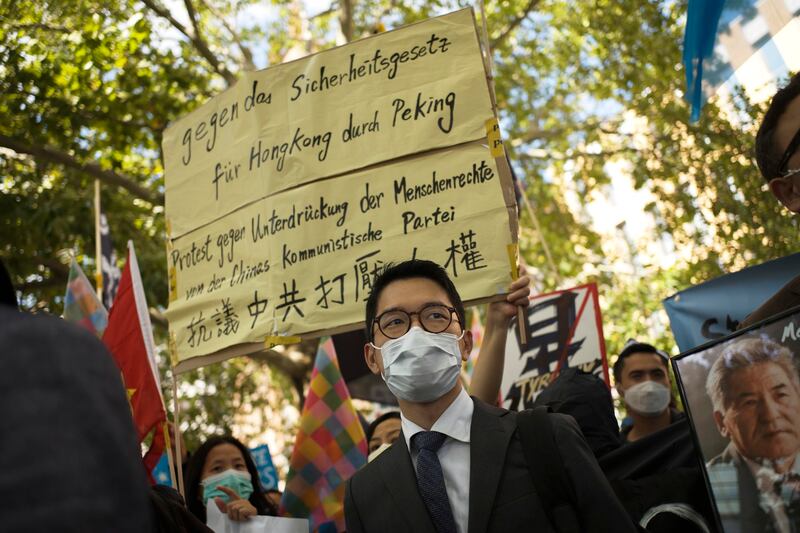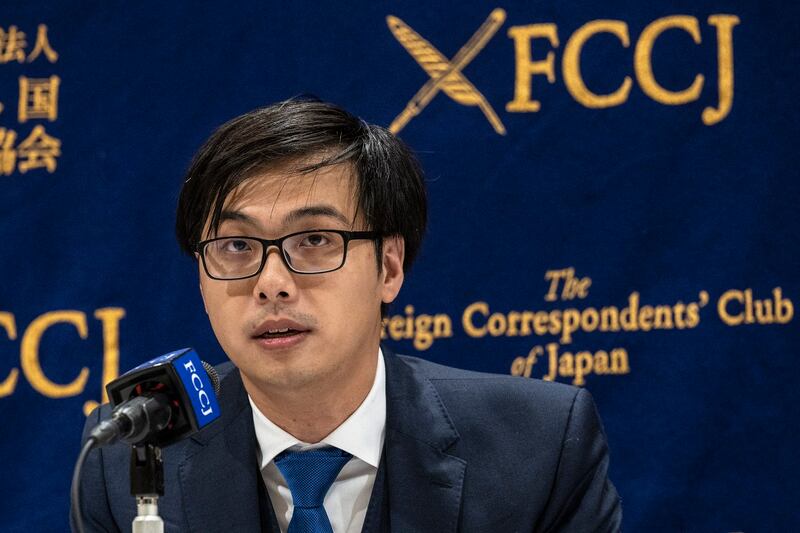A Hong Kong court has once more postponed the national security trial of pro-democracy media mogul Jimmy Lai for several months, while police questioned a woman with ties to exiled former lawmaker Nathan Law.
A panel of three High Court judges delayed Lai's trial until Dec. 18, the second delay since the original trial date was set for December 2022.
Lai, who founded the now-shuttered pro-democracy Apple Daily newspaper, faces two counts of "conspiracy to collude with foreign forces" and one count of "collusion with foreign forces" under a draconian security law imposed by Beijing in the wake of the 2019 protest movement, along with a charge relating to "seditious" publications.
He was first arrested in August 2020 and is currently serving time for fraud in connection with the lease on his Next Digital media empire's headquarters.
Meanwhile, Hong Kong National Security Police questioned a woman with reported links to Law, one of the eight activists in exile with arrest warrants and bounties on their heads, the London-based rights group Hong Kong Watch reported.
The move comes after police detained and questioned the parents of fellow overseas activist Anna Kwok, who heads the Hong Kong Democracy Council, a U.S.-based lobby group.

Kwok and Law are among eight prominent overseas Hong Kongers wanted by the authorities for "collusion with foreign forces" under the national security law, with a HK$1 million bounty on each of their heads, as the city authorities claim the right to "long-arm" enforcement of the law anywhere in the world.
Hong Kong leader John Lee has vowed to pursue the eight activists for the rest of their lives.
"This was the latest escalation in the application of the Hong Kong National Security Law against opposition figures, in particular since the announcement of arrest warrants and bounties against the eight activists in exile," Hong Kong Watch said in a brief statement.
Looking like the mainland
Former pro-democracy district councilor Sam Yip, who is currently studying in Tokyo, said Hong Kong's judicial system is looking increasingly like that of mainland China.
"It's very similar to the Chinese courts, where the prosecution and courts can extend an arrested person's time in detention at will," Yip said. "The courts and the entire judicial system in Hong Kong are nearly identical with those in mainland China, particularly where national security law cases are concerned."
"Those cases no longer follow the common law system, but instead follow the Chinese legal system."
He said the common law system once ensured a fair trial in Hong Kong, but no longer.

A former adviser to the Chinese Communist Party government in Beijing last week criticized the Hong Kong government over its plan to allow extradition to mainland China, which sparked the mass protests of 2019 and the ensuing crackdown on public dissent.
Former Chinese People's Political Consultative Conference standing committee member Charles Ho said he had tried to dissuade the city's current and former leaders from pressing ahead with the plans, which sparked months of mass popular protest that broadened from an anti-extradition campaign to include demands for fully democratic elections.
Ho told a radio show last week that then Chief Executive Carrie Lam's handling of the protest was "a man-made disaster."
"I explained to her that if she went ahead and implemented the amendment to the Fugitive Offenders Ordinance, it would lead to U.S. sanctions on Hong Kong," Ho said, adding that he had issued the same warning to then security chief and current chief executive John Lee.
"I was in the Jockey Club coffee shop with John Lee, and I told him I had advised Lam not to do this, because it would affect Hong Kong's [trading status] with the United States," he said.
Then-U.S. President Donald Trump signed the Hong Kong Human Rights and Democracy Act into law in November 2019 after months of pro-democracy protests, targeting officials responsible for the erosion of the city's promised freedoms and prompting mass celebrations by protesters.
When Beijing imposed the National Security Law on Hong Kong from July 1, 2020, Washington responded by declaring an end to the city's status as a separate trading entity from mainland China.
Translated by Luisetta Mudie. Edited by Malcolm Foster.
